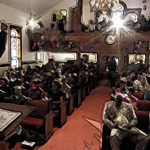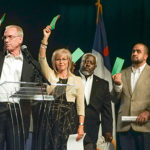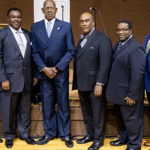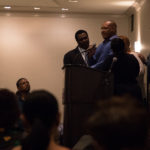WASHINGTON (RNS)—In Chicago, black Baptists announced they would raise $50 million for health clinics, schools and reconstructed churches in earthquake-devastated Haiti.
In South Carolina, three black Methodist denominations launched a plan to host Saturday academies nationwide to mentor young black males.
And in Miami, African-American Baptists, Methodists and Pentecostals decided to re-establish the Conference of National Black Churches to work together on health disparities, economic empowerment and social justice.
Recent months have seen a resurgence of interdenominational relations in some of the nation’s most prominent predominantly black churches.
|
Franklyn Richardson of Mount Vernon, N.Y., chairman of the National Action Network, exhorts his followers during an appearance at the National Baptist Convention, USA. (RNS File Photo/Aimee Jeansonne)
|
While some are responding to the tragedy in Haiti and others are trying to revive long-term efforts to help black communities, they all say they’ve determined they can do more together than any one group could do by itself.
“If we can make a difference with black men in our communities, it will affect the whole community,” said Carolyn Tyler Guidry, president of the Council of Bishops of the African Methodist Episcopal Church, one of the denominations that met at the black Methodist summit in Columbia, S.C. “It will affect families—black families in particular—when their men are not incarcerated or on drugs.”
Members of the AME Church, the African Methodist Episcopal Zion Church and the Christian Methodist Episcopal Church met in early March to plan the academies that will train youth in job preparation and study skills.
Just weeks before, leaders of those three denominations met with black Baptists and leaders of the Church of God in Christ to restart and rename the defunct Congress of National Black Churches.
The organization’s absence, combined with cyclical leadership changes, meant some black denominational leaders had lost touch with one another, said Franklyn Rich-ardson, chair of the new Conference of National Black Churches.
Sign up for our weekly edition and get all our headlines in your inbox on Thursdays
Now, he said, the denominations—with a combined membership of more than 21 million—hope to partner with groups like the Children’s Defense Fund and Al Sharpton’s National Action Network on AIDS, education, social justice and economic development.
“Denominations are so absorbed in trying to sustain … their specific mission that no denomination has the resources to take on education by itself or to take on social justice by itself,” said Richardson, a Baptist pastor in Mount Vernon, N.Y., who also chairs Sharpton’s network.
Stephen Thurston, president of the National Baptist Convention of America, said the gravity of a tragedy like the earthquake in Haiti prompted the leaders of five black Baptist churches to join forces for their five-year project.
Staccato Powell, who chaired the black Methodist summit in South Carolina, said African-American faith groups are taking responsibility for the challenges in the black community in ways that might not be as effective when they work with predominantly white denominations.
“Their passion is not the same because they don’t have the same issues at stake as we do,” he said. “Their children are not being carted off to prison by busloads. … This is about the survival of our people.”














We seek to connect God’s story and God’s people around the world. To learn more about God’s story, click here.
Send comments and feedback to Eric Black, our editor. For comments to be published, please specify “letter to the editor.” Maximum length for publication is 300 words.